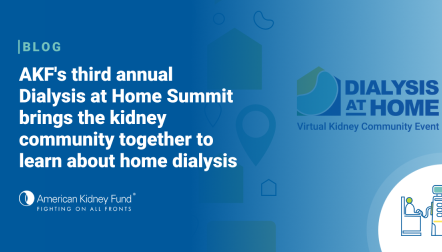
Blog post
Five steps to make sure you are ready for winter weather

With winter weather on the way, it is especially important to be prepared to take care of yourself in case the weather prevents you from getting to your dialysis center. There are some simple steps you can take to make sure you are prepared and have access to the things you need to stay healthy in the event of a winter storm.
1. Plan ahead
- If you know a storm is coming, arrange to have dialysis early, before the storm arrives. Also, before the storm, start eating a kidney-friendly eating plan to control the build-up of potassium, phosphorus, urea and fluid while you are unable to have dialysis.
- Make a winter storm preparedness (prep) kit. Choose a safe place in your home that is easy to access, where you will keep all of your disaster prep supplies and materials. If something happens, you will know exactly where to go to find everything you need.
- Plan how you will keep food and medicines cold if the power goes out.
- Plan to have someone help you salt and shovel your walkway and driveway. If you live in an apartment, make sure the building management knows that you will need to get out for your treatments.
2. Be in the know
- Know how your community notifies residents of coming storms.
- Know how your public transportation system functions in icy or snowy weather.
- If you are on home dialysis, contact your provider to find out what you should do in the event of a winter storm.
- Make a list of your medicines, doses and when they should be taken. Note which medicines on your list, if any, need to be refrigerated. Also write down the name and phone number of your pharmacy. Keep this list in your winter storm prep kit.
- Make a list of the names and contact information of all members of your health care team (doctors, nurses, dietitians, etc.). Keep this list in your winter storm prep kit.
- Keep a list of phone numbers of nearby dialysis centers. Keep this list in your winter storm prep kit.
3. Be your own advocate
- Keep a patient ID card with you. If you do not have one, ask the staff at your dialysis center to get one for you and help you fill it out.
- Consider wearing a medical alert bracelet. This will inform emergency response personnel that you are a person on dialysis. You may also include on your bracelet any other conditions that may affect how you are cared for (diabetes or allergies to medicines, for example).
- Some utility (gas, water, electric) companies keep lists of people in their communities who need their utilities for survival, such as people on dialysis. These people are given priority to have their utility service restored as quickly as possible in case of an outage. Contact your utility companies to find out if they offer this, and ask to be put on a priority restoration list.
- Identify an emergency contact person. This could be a family member, friend or neighbor, but whoever you choose should be someone who knows how to contact you if you need to be reached.
4. Stock up
- Create an emergency first aid kit. Some key items to keep in your kit are adhesive bandages, antibiotic cream, and a five- to seven-day supply of all of your medicines. If you are diabetic, you will need a glucose meter and test strips. A more complete list of what to include in your kit can be found in the Center for Medicare and Medicaid Services' booklet, "Preparing for Emergencies: A Guide for People on Dialysis."
- Create an emergency food supply with three days' worth of food. Choose non-perishable foods that will sustain you, while also enabling you to limit your intake of protein, potassium, salt and fluid. If you are diabetic, you will also need to control your sugar intake. A sample three-day emergency diet plan can be found in the Center for Medicare and Medicaid Services' booklet, "Preparing for Emergencies: A Guide for People on Dialysis."
- Make sure you always have enough of your medicines to last you for a few days in case you do not have access to a pharmacy.
5. Check up
Just like you have check-ups with your doctors to make sure everything is going as planned, you should have a schedule for checking on your disaster preparedness plans. A good way to remind yourself is to do this every time you change your clocks. Make sure:
- The food in your emergency supply has not expired.
- Important phone numbers and addresses have not changed.
- Your list of medicines is up to date.
- Your first aid kit is well-stocked.
- Your batteries are still good.
- You are up to date on your vaccines.
Additional resources:
American Kidney Fund
www.kidneyfund.org
Kidney Community Emergency Response Coalition
(516) 209-5253
www.kcercoalition.com
Preparing for Emergencies: A Guide for People on Dialysis
http://kcercoalition.com/wp-content/uploads/2014/09/Preparing-for-Emergencies.pdf





